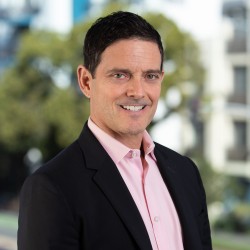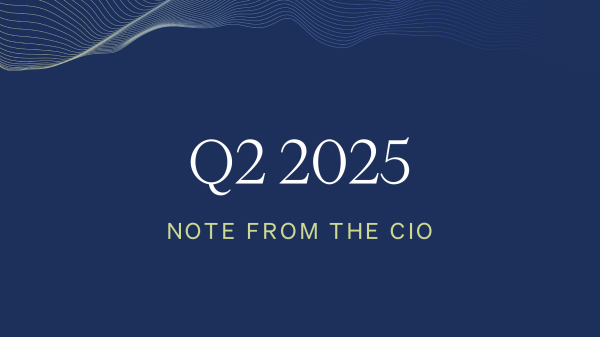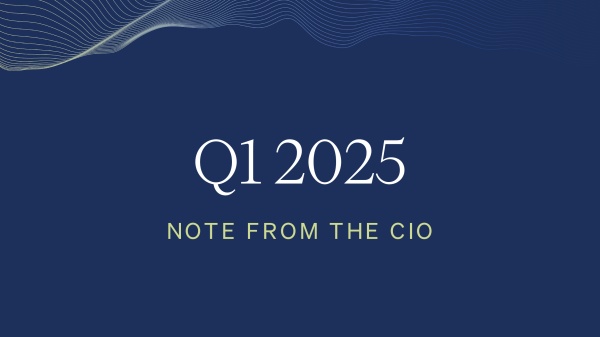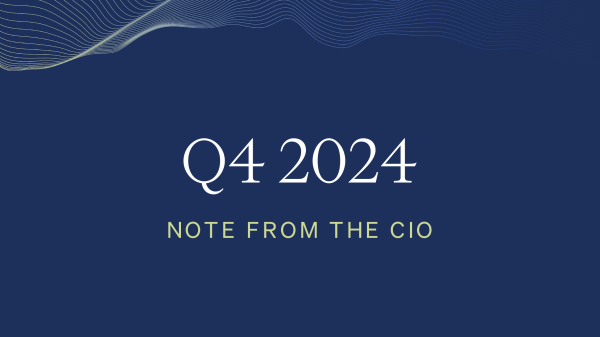Free Minds and Innovation - The Fuel of Investing
- Note from the CIO
- Investment Management
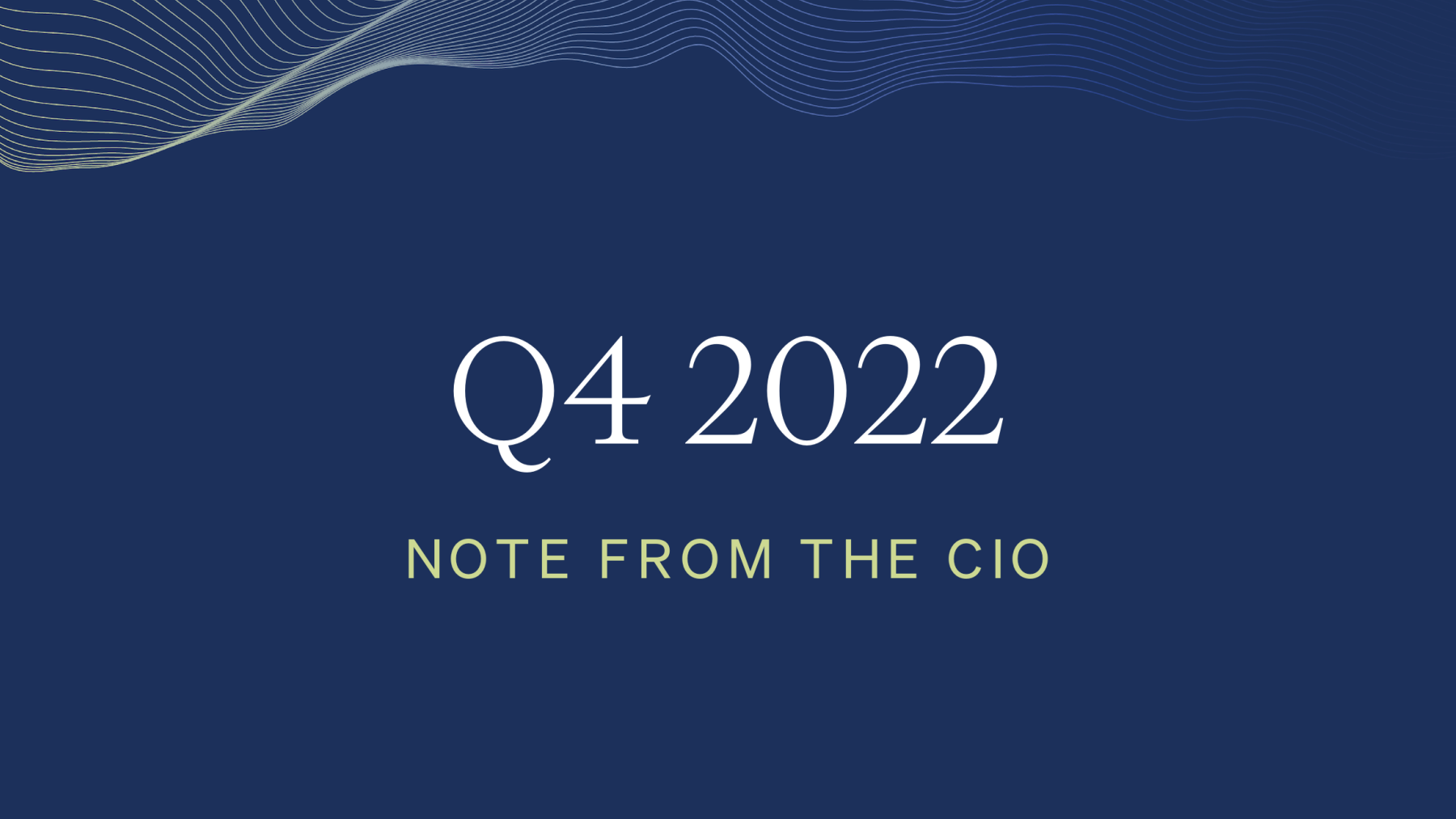
It is hard to deny that last year was difficult. We watched in horror as Russia invaded Ukraine, an unthinkable act of barbarism by a major country in modern times. Annual inflation reached a 40-year high, peaking at 9.1% in June and reaching similar highs in many other countries. In response, central banks around the world aggressively raised interest rates. The Fed hiked rates by 4.25% in the U.S., making it difficult for people to borrow money and buy homes, and for businesses to finance operations. These rate hikes created fears of impending recessions across the world economy, causing the return on the companies around the globe to drop 18.4% in U.S. dollars, the worst calendar-year drop in stocks since 2008. Bonds worldwide had their worst year on record, dropping 11.2% in U.S. dollars, significantly surpassing the previous record fall of 3.6% in 1994. Domestically, we dealt with tragedies, including the Uvalde, Texas school shooting and Hurricane Ian.
But I want to tell a different story about 2022
In this version, the Ukrainian people are fighting for something they believe in and continue to this day to defend themselves heroically. Also winning the hearts of the world, the women of Iran began a revolution, calling for liberty from a tyrannical regime, while the people of China, after reaching a melting point, demanded the reversal of the authoritarian COVID lockdown policies they suffered under for nearly three years. Liberalization of people is not only necessary for economic progress, but also the fundamental fuel for human flourishing.
In this account of 2022, we also witnessed great achievements in science and fundamental research:
Oxford scientists developed a “world-changing” malaria vaccine, with an agreement to manufacture more than 100 million doses per year.
U.S. scientists, for the first time ever, generated more energy using nuclear fusion than required as input, creating what could be a “Wright brothers” moment in energy. This proof of concept just might bring a new era of cheap, abundant and reliable energy in the coming decades that would be transformative for the three billion people who have limited access to energy, while having no warming effect on the planet.
NASA successfully shoved an asteroid onto a new path by colliding a shuttle into it, a technique that one day could save all life on the planet.
Illumina, a San Diego–based company, unveiled technology that can sequence a human genome for merely $200. The original Human Genome project in 1990 cost $2.7 billion to do the same thing.
India has almost wiped out extreme poverty.
The world has passed peak agricultural land which means that even though agricultural production continues to grow, it is doing so in more efficient ways that amount to a decreasing use of land needed to grow crops and raise livestock.
The artificial intelligence research laboratory OpenAI created buzz in 2022 with the launch of ChatGPT, an AI-powered website that simulates having a human conversation with someone who knows the answers to everything on the internet. For many, it gives a glimpse of what life could be like in the not-so-distant future when we all might have a personal AI assistant to help manage our lives, free up our time, and make us more productive.
The New York Times reported in October that “we have cut expected [global] warming almost in half in just five years.”
Why are these advances important?
Scientific research and advancements eventually lead to research and development by companies, followed by breakthrough technologies and improvements to our quality of living. Companies profit by delivering this value, which is the reason we expect the value of our investments to go up over time.
The historical record of economic progress and human flourishing resulting from liberalization of people and technological innovations is conclusive:
In 1970, the world watched in fright as the entire team of NASA’s most brilliant scientists used slide rules to figure out the return path home for the damaged Apollo 13 spacecraft because their mainframe computers crashed under the complexity of the problem. It is a story of the great endurance and ingenuity, but just a year later the essential building block of all modernity was introduced: the microprocessor. Today, the smartphone of a middle schooler has vastly more computing power than was available to NASA in 1970—not to mention providing access to the entire sum of human knowledge.
In 1970, nearly half the world lived in extreme poverty, according to the World Bank. By 2020, that percentage shrank to 9%.
Since 1970, the 500 largest U.S. companies have returned 10.4% per year on average, which means $10,000 invested in 1970 would be worth over $1.9 million today.
In 1800, 70% of Americans worked on farms. Today fewer than 1% directly work on the production of food.1
As a result of an abundance of food, malnutrition globally decreased from 65% in 1950 to 9% in 2019.
In 1830 the average worker put in 70-hour weeks. Today, we have a 40-hour average work week, and for many, work involves Zoom calls and flexible hours.
Since 1820, the world population has increased eightfold, while the global economy has expanded one hundredfold, which is why our lifestyles today were unfathomable two hundred years ago. And assuming only the growth rate of 2.8% that the global economy has experienced this century, the economy will increase another tenfold by the end of the century.2
In 1800, the average global income could buy the same amount of basic goods and services that $1,100 of income could buy today. Yet, the average global income today is $15,000.
Global life expectancy has doubled over the past two hundred years.
All this modernization has resulted in a warming planet, but it has also resulted in the number of climate related deaths worldwide shrinking 97% from 485,000 in 1925 to 15,000 in 2020 (with a population that is four times greater than in 1925). This is an encouraging sign of our ability to adapt to a wide range of climates.
There is every reason to expect that the scientific breakthroughs of 2022 will eventually give way to further enhancements in our quality of living. Looking forward, the Brookings Institute projects that between the years 2020 and 2030, 1.6 billion people will enter the middle class in the developing nations. The opportunity for companies around the world to meet their consumer needs is tremendous.
The companies that will deliver this value can expect to earn profits, and the investors who provide the capital to those companies can expect to earn returns commensurate with the risk. That is how it has always been.
That is why we invest — and stay invested — with confidence.
DISCLOSURE: Quantum Financial Advisors, LLC is an SEC registered investment adviser. SEC registration does not constitute an endorsement of Quantum Financial Advisors, LLC by the SEC nor does it indicate that Quantum Financial Advisors, LLC has attained a particular level of skill or ability. This material prepared by Quantum Financial Advisors, LLC is for informational purposes only and is accurate as of the date it was prepared. It is not intended to serve as a substitute for personalized investment advice or as a recommendation or solicitation of any particular security, strategy or investment product. Advisory services are only offered to clients or prospective clients where Quantum Financial Advisors, LLC and its representatives are properly licensed or exempt from licensure. No advice may be rendered by Quantum Financial Advisors, LLC unless a client service agreement is in place. This material is not intended to serve as personalized tax, legal, and/or investment advice since the availability and effectiveness of any strategy is dependent upon your individual facts and circumstances. Quantum Financial Advisors, LLC is not an accounting or legal firm. Please consult with your tax and/or legal professional regarding your specific tax and/or legal situation when determining if any of the mentioned strategies are right for you.
Please Note: Quantum does not make any representations or warranties as to the accuracy, timeliness, suitability, and completeness, or relevance of any information prepared by an unaffiliated third party, whether linked to Quantum’s website or blog or incorporated herein, and takes no responsibility for any such content. All such information is provided solely for convenience purposes only and all users thereof should be guided accordingly.
For more information about Quantum and this article, please read these important disclosures.
- Note from the CIO
- Investment Management
Darius Gagne, PhD, CFP®, CFA
Darius Gagne is the Chief Investment Officer of Quantum Financial Advisors, LLC. Darius is also a Financial Advisor directly to clients and a founding partner of the firm.
Read More
